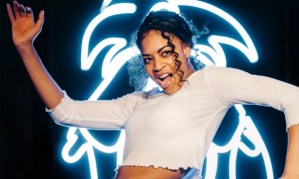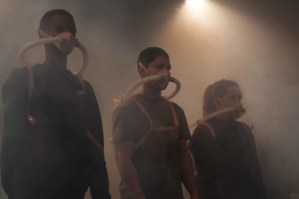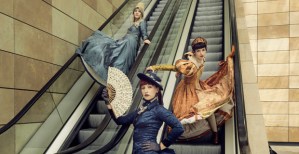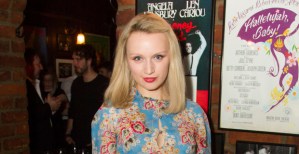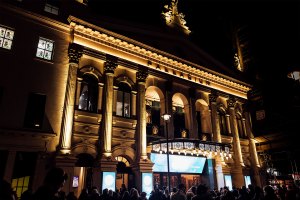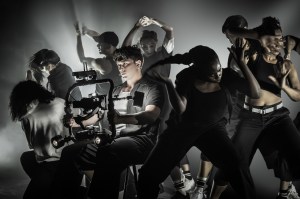Review: Nightclubbing (Camden People's Theatre)
Rachael Young’s piece focuses on the singer Grace Jones to explore ideas of beauty
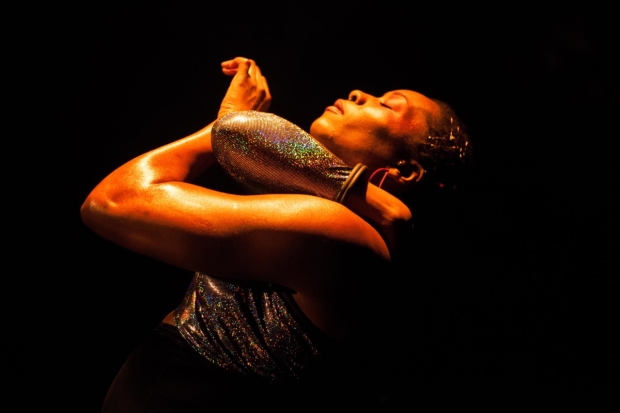
© Marcus Hessenberg
On a dark stage, a black woman is barely visible. Pale lighting glimmers off a silver glitter curtain. It sparkles across Rachael Young's silvery top, and catches the edges of her dark skin. By the end of Nightclubbing, everything's changed. She basks in a soft, warm orange glow, swaddled up in a reflective gold metallic dress. Her oiled skin glistens. Her blackness stands out. She makes herself seen.
Performance is, at heart, transformative. At least, it can be. Or should be. In those terms, Nightclubbing is a kind of chrysalis – only Young doesn't simply transform herself. She seems to turn the whole world inside out; inverts it, subverts it. It's a quietly astonishing act.
In 2015, two black women were turned away from a London club – even as their lighter-skinned friends were allowed in. They were deemed "too overweight" and "too dark" – dismissals that, very charitably interpreted, speak volumes about beauty standards; standards set against white norms – slight bodies, straight hair, rosy cheeks, narrow noses.
In Nightclubbing, Young counters that story with a critique of Grace Jones, the polymath actor-singer-model whose iconic 1981 album supplies the show's title. Jones' extraordinary look – angular cheekbones heightened by angular clothes, hair squared off, contours dusted with colour – was, Young insists, an active, political, revolutionary choice. It was always a way of making herself seen.
To be black in a white world, Young says early on, is to be "super-invisible and hypervisible"; to go unseen and to stick out at the same time. What those young clubbers went through – first seen, then sent away – is typical of the black experience. Jones disrupted and disarmed it.
Overlooked in New York early in her career, she got herself spotted in Paris. She transformed her appearance to ensure she was seen – so hypervisible she stopped being see-through. Jones forged "whole new ways of being in the world and being in her skin". By standing out, she was invited in. Young's text is gorgeous, her thinking exact, so that Nightclubbing becomes both dreamy and fervent.
It's a short piece, in at under an hour, but its ideas are so expansive that Nightclubbing never feels slight. Backed by a woozy, pulsating soundtrack – Mwen Rukandema on decks, Leisha Thomas on guitars – it entrances almost until it slips out of time. Moving slowly, speaking sparingly, Young takes her time and fills the space. She, too, ensures that she's seen.
Emerging from a black binbag dress as if it were a weird amniotic sac, Young adorns herself in black cables and shapes a Grace Jones style hood. She makes herself strange, unworldly and unreal. If blackness was seen as such, Jones – and now Young – turned that into a strength. At odds with the world, she made herself alien.
Young follows suit – then pushes beyond. She reframes black skin not as a social deficiency, but as an evolutionary strength; melanin a superpower capable of offseting the sun. She moves from apology to assertion, and a piece that starts with a litany of sorries (for my features, my muscles, for the chip on my shoulder) – her hands up, a hula hoop holding her in place – ends with a statement of ownership: "living black, holding black, seeing through black eyes." Like Jones, Young makes herself alien, but she ends by changing the planet: a new world and a background that better suits blackness.
Nightclubbing runs at the Camden People's Theatre until 15 May, then tours.




